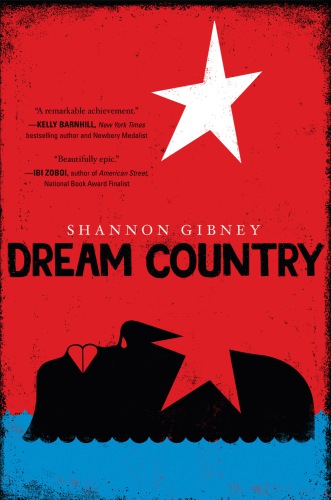
Dream Country
فرمت کتاب
ebook
تاریخ انتشار
2018
Lexile Score
900
Reading Level
4-5
نویسنده
Shannon Gibneyشابک
9780735231696
کتاب های مرتبط
- اطلاعات
- نقد و بررسی
- دیدگاه کاربران
نقد و بررسی

August 1, 2018
Gr 9 Up-The author's sophomore novel follows the disjointed immigration patterns experienced in one African family. Kollie Flomo is a young teen struggling to connect his American and Liberian identities. His apathetic performance in school and the bullying he experiences from his African American classmates exposes an explosive anger he can barely control. After a school skirmish leads to a public shaming of the family, Kollie's father sends him back to Liberia in an effort to reform him. Kollie's ancestor Togar's experience with immigration is completely involuntary. Slavers partnered with other Africans in a bid to supply plantations with free labor. His attempts to evade the slavers infecting his country result in a net loss of identity and family. Togar's great granddaughter Yasmine is a free African American woman in slavery-riddled America. She decides to take a gamble on a repatriation scheme orchestrated by white men that promises a better life for her children. This story that highlights the inconsistencies between the beliefs a country projects to the world at large and the realities experienced by immigrants. The African and American characters in this story are hoodwinked multiple times by their adopted and birth countries. The disconnect between a dream fulfilled and a dream diminished by reality negatively impacts the characters' view of themselves and their place within their chosen countries. The importance of giving immigrants power to create their own story is wonderfully illustrated in this book. VERDICT An excellent choice for both public and school libraries.-Desiree Thomas, Worthington Library, OH
Copyright 2018 School Library Journal, LLC Used with permission.

August 15, 2018
Gibney (See No Color, 2015) skillfully navigates centuries of colonial violence, emphasizing the importance of privileging impact over intention in historical texts.A comprehensive, but not entirely cohesive, timeline introduces a family beginning in 1827 at a plantation in Virginia. The story moves through the brutal colonization of Liberia, detailed further in the backmatter, by Europeans alongside white Americans and freed or escaped black slaves and ends with the prescient voice of Angel, a "black-African-queer" woman in present-day Minnesota. Gibney creates clear voices for her characters, most strikingly with 16-year-old Kollie, a Liberian refugee whose experience at his high school explores a microcosm of real discord between African-Americans and immigrants or refugees from myriad African countries living in the U.S. The naming of specific tribes in what became Liberia, and the inclusion of traditional proverbs alongside quotations from African-American writers, further spotlights the complicated, ever intertwined existences of black people all over the world. A nuanced focus on Liberia through the perspective of this one family, five generations described in five parts, therefore becomes a moving and melancholic metaphor for the struggle for place and home experienced by those still trapped by the legacy of the triangle of trans-Atlantic trade.A necessary reckoning of tensions within the African diaspora--an introduction to its brokenness and a place to start healing. (author's note, further resources, timeline) (Historical fiction. 15-adult)
COPYRIGHT(2018) Kirkus Reviews, ALL RIGHTS RESERVED.

Starred review from October 1, 2018
This expansive tale, composed of interwoven stories, features members of a family tree that spans five generations and two continents, united in their sense of displacement and longing for a homeland where they can thrive. Alternating between the United States and Liberia, Gibney (See No Color) captures moments of wrenching decision-making in her characters’ lives. The opening story, set in 2008 in a Minnesota community roiled by ethnic tensions between Liberians and African-Americans, features drug-dealing teenager Kollie, whose parents return him to Liberia to learn to “be a good boy there again.” In the second story, set in 1926 Liberia, 18-year-old Togor flees brutal Congo soldiers. The third story follows Yasmin and her family as they move from 1827 Norfolk, Va., to Monrovia, Liberia, to escape slavery and establish a home. The final stories circle back to Kollie’s immediate family—concluding with a chapter devoted to his queer younger sister, Angel, in 2018 Minneapolis. With riveting, lyrical prose, Gibney’s accomplished novel explores universal themes of home, family, power struggles, and endurance while demonstrating the liberating power of storytelling. Ages 14–up.

Starred review from September 1, 2018
Grades 9-12 *Starred Review* When 17-year-old Liberian refugee Kollie Flomo reacts violently to constant bullying by his American classmates, he is instantly punished: his parents, unaware of his undiagnosed PTSD, and fearing embarrassment from their community, underhandedly send him back to Monrovia to attend reform school. From there, Gibney's novel shifts among points of view, eras, and countries as she climbs further into Kollie's family tree, highlighting the struggles of Kollie's ancestors amid culture clashes and important moments in Liberia's history. Each narrator's trajectory tangles into the others: Yasmine Wright, a freed slave in 1826, hopes to have control over her own destiny; Togar, her Liberian descendant a hundred years later, deals with the harsh brutality of colonialism; and finally Kollie's own father, in 1980, is empowered by revolution, only to see his dreams for a more united country fail to take fruit. Under a less adept hand, this could be a tangled mess of a book, but Gibney blesses the reader with a marvelous literary tapestry of family, sacrifice, and dreams, examining the lingering effects of slavery and racism in both the U.S. and Liberia. This powerful novel demonstrates how nonlinear history can be, ways the present is a consequence of the past, and that, though traumatized people can sometimes hurt others when trying to heal themselves, there's nevertheless strength in hope that can keep us moving forward.(Reprinted with permission of Booklist, copyright 2018, American Library Association.)

























دیدگاه کاربران